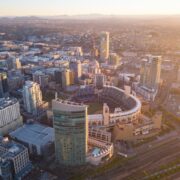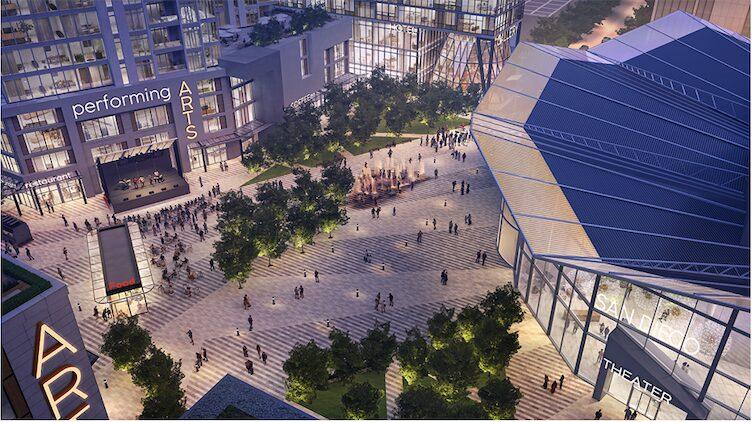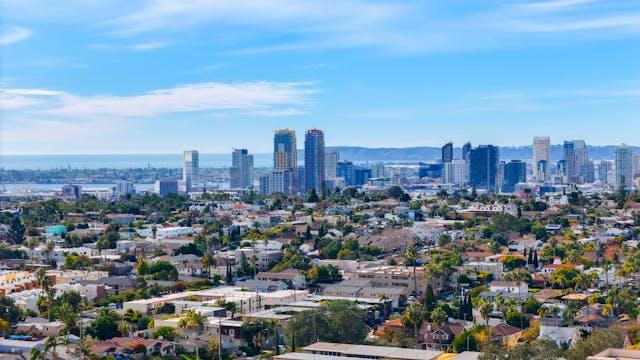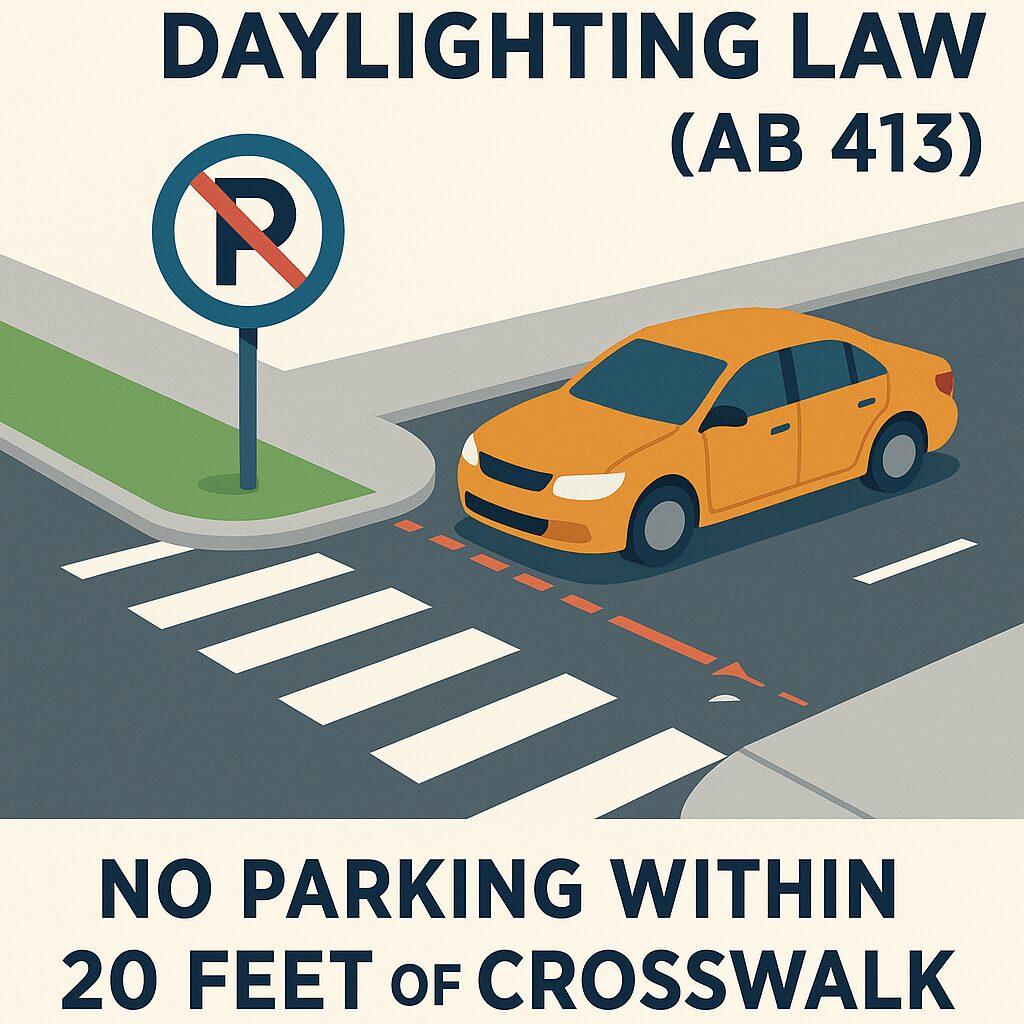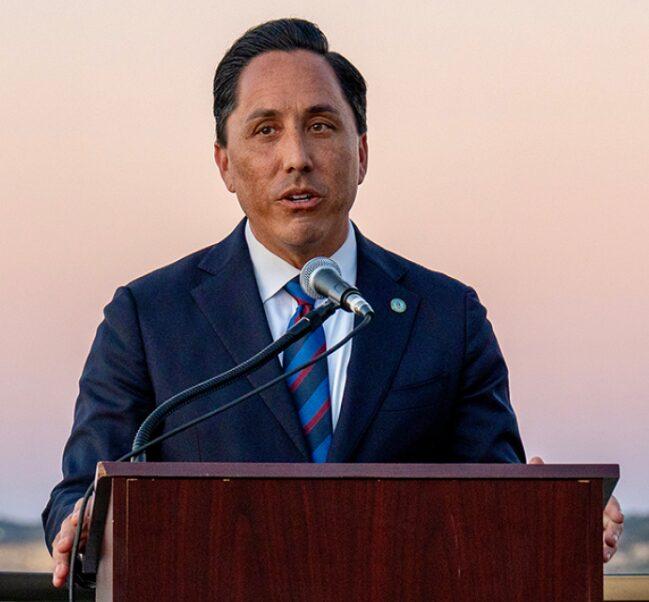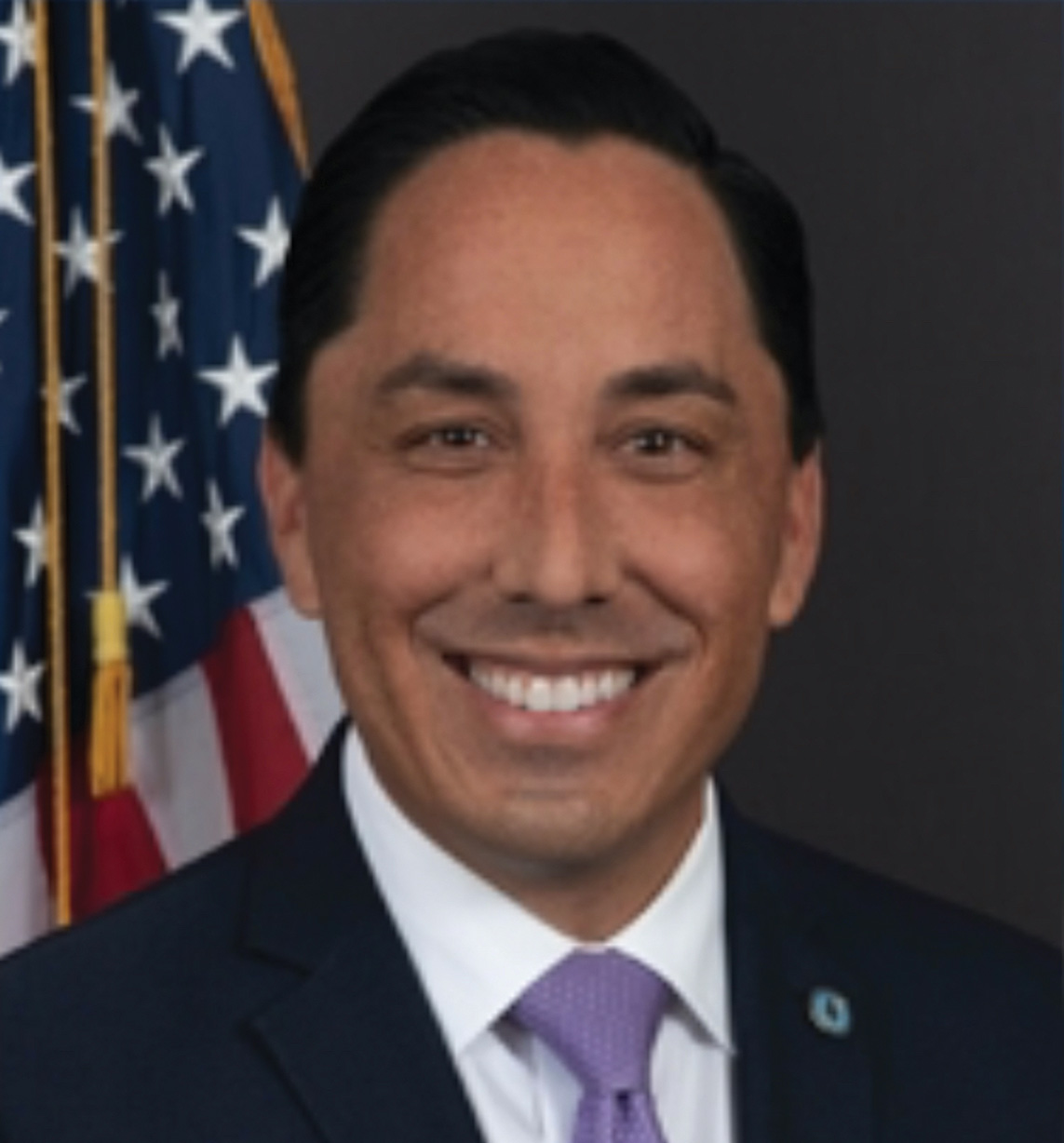
File photo/www.sandiego.gov
Mayor’s state of the city address details strong progress on San Diego’s most critical issues
SAN DIEGO – In his third State of the City address as the 37th Mayor of the City of San Diego, Mayor Todd Gloria detailed the considerable progress on the city’s top issues – infrastructure, public safety, homelessness and housing affordability. The mayor made
several policy announcements as part of his address, among them an executive order – signed moments before he took the stage – that will expedite city approval of affordable housing projects to 30 days.
“None of tonight should come with the suggestion of mission accomplished,” Mayor Todd Gloria said. “Our city has crawled out of the deepest of valleys, and we now find ourselves climbing the highest of mountains. The summit may be far in the distance, but San Diego is taking steps every day to reach it – and we will.”
After delivering his first two State of the City addresses virtually to prevent the spread of COVID-19, Mayor Gloria gave this year’s speech in front of a live audience at the Civic Theater, a location that symbolizes the city’s aspirations to revitalize neglected public sites to add significantly to the region’s housing supply. The theater sits amid six blocks in Downtown’s civic core that the city plans to redevelop into a new city administration hub and thousands of homes for working-class San Diegans.
“This once-in-a-lifetime transformation will revive the Downtown civic core, create a welcoming place of beauty and culture that will serve generations long into the future and that is emblematic of the big-city energy we must embody,” Mayor Gloria said.
Consistent with his long-held priorities, the mayor focused his speech on infrastructure, public safety, homelessness and housing. He filtered his address through the experiences and stories of everyday San Diegans whose lives have intersected with and influenced the city’s progress toward better, more equitable infrastructure and services.
Noting that he is “impatient for progress,” the mayor announced new measures to speed up progress on key priorities like permitting affordable housing, fixing streets and sidewalks, reducing the number of people who are homeless and living on the streets and recruiting police officers to help San Diego remain one of the nation’s safest big cities.
Mayor Gloria also touted progress on San Diegans’ top priorities, highlighting the decrease in crime in 2022, significant progress on park improvements and street repaving, and the movement off the streets and into stable housing for more than 2,200 unsheltered San Diegans over the past year.
Infrastructure
In talking about infrastructure, Mayor Gloria introduced two San Diego families, the Walkers of Paradise Hills and the Winters of Scripps Ranch. Daneyel and Tommy Walker run a coffee shop in Encanto and for years have been advocating for community improvements like sidewalks and streetlights in southeastern San Diego. Steven and Jennifer Winter and their sons Austin, Carson and Jackson waited for nearly a decade for a promised park to be completed near their home in Scripps Ranch.
The mayor highlighted the city’s completion of these and other long-awaited projects and said the city owes it to families like the Walkers and the Winters to get improvements done faster.
“I recognize there will always be roadblocks of some kind,” he said, “Our job is to find a way around them – or over or under or through them – so we deliver for San Diegans.”
On roads, Mayor Gloria announced that this fiscal year, the city is doubling the number of miles of freshly repaved streets compared with each of the prior two fiscal years. When including slurry seal, the city will resurface 283 miles of resurfaced streets this fiscal year – more than a 40-percent increase over the previous fiscal year.
“I’m still with my fellow San Diegans in our continued quest to fix the damn roads!” Mayor Gloria said. “And we are getting it done.”
The mayor pointed to his proposed update of the city’s Street Preservation Ordinance as an additional tool to improve San Diego’s road conditions. The amended ordinance would require utilities that dig up the streets to repair them more fully and quickly – and to foot the bill for the restoration.
“It’s a simple concept: You break it, you fix it!” he said.
In fiscal year 2024, the updated ordinance is expected to result in an additional 25 miles of repaved streets.
Mayor Gloria also announced a new initiative to streamline permitting and reduce fees for property owners to repair sidewalks in front of their homes or businesses.
Recognizing the critical role parks and green space play in enhancing quality of life, Mayor Gloria noted that in 2022, the city opened nine new parks and improved 15 more. He also announced that in 2023, the city is expected to complete 13 new parks and improve 18 more – for a total of 55 new or improved parks throughout San Diego in two years’ time.
The mayor highlighted progress on other long-awaited city facilities, including the Torrey Pines, Skyline Hills and Fairmont fire stations, as well as new or expanded branch libraries in Pacific Highlands Ranch, Oak Park, Ocean Beach, City Heights, San Carlos and Linda Vista.
Public safety
Last year in his State of the City, Mayor Gloria committed to fully funding all of the city’s public safety services and followed through with that commitment in his budget. This year, the mayor committed to do the same in order to keep San Diego one of the safest big cities in the country.
Unlike other big cities in the nation, the mayor announced that crime in San Diego went down 7.5 percent in 2022. Property crime went down by 9.7 percent, while the most serious violent crimes were down by 13 percent. This is according to the latest data from the San Diego Police Department.
“I’ve said it before, and I’ll say it again: Lawlessness will not rule the day in our city,” the mayor said.
Pointing to a crisis that has quietly grown during the past five years, Mayor Gloria expressed his support for law enforcement’s efforts to fight the powerfully addictive illicit fentanyl. In November, he signed an executive order to strengthen and prioritize enforcement around illicit fentanyl, and he has asked federal leaders to permanently classify it as a Schedule 1 drug.
“We need stronger laws at the state and federal level that give teeth to law enforcement’s efforts at the local level,” he said. “Current laws do not fully take into account the game-changing reality of how potent and deadly it is, nor its outsized impact on our most vulnerable residents.”
Mayor Gloria highlighted San Diego Police officer Erica Perez, who grew up in a challenging environment and overcame many obstacles to become a law-enforcement officer. Officer Perez embodies the city’s efforts to diversify its police department so that our officers better reflect the people they protect and serve, particularly through the recruitment of women and people of color.
Homelessness
During his speech, Mayor Gloria introduced the audience to Natasha and Gabriel Martin, San Diegans whose lives have been upended by fentanyl and other dangerous drugs and who became homeless as a result.
The mayor detailed his comprehensive strategy to help people like the Martins by investing in robust street outreach, increased shelter capacity and more permanent supportive housing, as well as advocacy at the state and federal levels to reform and strengthen mental-health and substance-abuse interventions.
In 2022, Mayor Gloria was among the foremost champions of Gov. Gavin Newsom’s CARE Court initiative, which will connect people struggling with untreated mental illness with a court-supervised care plan that provides the help and support they need. San Diego County will be among the first in the state to implement the program.
He also pledged to team up again this year with State Sen. Susan Eggman to reintroduce conservatorship reform legislation, an effort that narrowly fell short last legislative session. This year, he’ll advocate from the position of chair of the bipartisan California Big City Mayors Coalition, which represents the state’s 13 largest cities that are home to roughly 11 million Californians.
Since April 2021, the city has made an additional 658 shelter beds available to get folks off the street – a 61-percent increase. In 2022, partnering with the County, the San Diego Housing Commission and several homelessness service providers, the city opened five new shelters that prioritize vulnerable populations like seniors and people who struggle with mental illness and addiction.
Mayor Gloria announced that, as early as next week, the city will open part of the old central library in Downtown as a temporary shelter for women and soon will open a large shelter with private rooms for families. He also announced that the city plans to open a fourth site in its Safe Parking Program for people who have vehicles but not homes.
He said street outreach and shelters serve as important and effective connections to housing.
“I am so proud to report that in 2022, more than 2,200 people ended their homelessness through the City’s outreach and shelter system,” he said.
The vast majority of those people – nearly 1,900 – had moved into permanent housing.
“The problem we face is that, for every 10 people we get off the street and into housing, 13 people become homeless – many for the first time,” he said. “The reality is, there are San Diegans who simply are not able to keep up with the rising cost of living. It’s clear that we must focus more attention on the upstream causes of homelessness to give people a better shot at remaining housed through tough times.”
To address this, the mayor said that this year, he and City Council President Sean Elo-Rivera will build out their recently announced framework to strengthen protections and assistance for renters to prevent additional homelessness.
The mayor also announced that the San Diego Housing Commission will double the funding for homelessness prevention programs from $2 million to $4 million. “This will help an additional 250 households, prioritizing seniors, persons with disabilities and families with young children,” he said.
Housing
Mayor Gloria introduced Aidan Lin, a 20-year-old, civically active UC San Diego student who would like to stay and build a life in San Diego after graduation but worries that he won’t be able to due to the high cost of housing.
“We all know where our failure to build more homes has gotten us: sky-high rents, homelessness, families moving out-of-state, bright people leaving us for lower-cost cities,” he said. “It causes many of our residents to not see a future for themselves here.”
The mayor laid out the city’s progress in addressing the housing-affordability crisis, a series of actions that led the State of California recently to officially designate San Diego as a Prohousing City, one of only seven cities in the state – and by far the largest – to earn the recognition. The designation gives the city an advantage when applying for grant funding.
Mayor Gloria’s “Homes For All of Us” initiative contains two Housing Action Packages that contain a total of 20 policy reforms that will make it easier to build affordable housing across the city. He announced that the second package of reforms will be presented to the City Council in 2023.
Among the reforms are measures to build more student housing, prevent displacement and implement Senate Bill 10, a state law that enables cities to streamline projects near public transit that have up to 10 homes per parcel.
The mayor’s “Bridge to Home” initiative invests city dollars directly into affordable housing, providing gap financing to help get shovels in the ground faster. Through two rounds of funding, the city has helped get 10 projects over the finish line, totaling 908 affordable rental homes. Funding for Round 3 is expected to be announced in 2023.
Overall, in 2022, the city permitted 5,000 new homes, with another 7,000 currently in the pipeline.
One way the City is increasing housing capacity, the mayor said, is by quickly updating the community plans that serve as blueprints for future growth.
Since Mayor took office, the city has created the opportunity to build more than 45,000 new homes in Mira Mesa, Barrio Logan, and Kearny Mesa. In 2023, he said, the City will complete three additional plan updates that more than double the capacity for new homes in University City, Hillcrest and the College Area.
And yet, he said, “we still have so much work to do to meet both the housing mandates of the State and our moral obligation to the people and families of San Diego today.”
Mayor Gloria announced that he had signed an executive order moments before coming on stage directing all relevant city departments to complete their review and approve 100-percent affordable housing projects within 30 days – a process that right now can take upwards of six months.
The executive order also directs the city’s Development Services Department to expeditiously hire new positions to review and issue housing permits and immediately implement contracts to address the permitting backlog.
Mayor Gloria highlighted the potential to add significantly to the region’s housing stock through the redevelopment of the Sports Arena area, with its promise of 4,000 new homes – roughly half of which will be affordable – as well as the revitalization of Downtown San Diego’s Civic Center. These transformational projects, the mayor said, are indicative of a city that is “rising.”
“Rising to the challenge of addressing chronic homelessness,” he said. “Rising to build more housing. Rising up against the urge to say ‘no’ because change is scary. Rising to meet the expectations of all our neighborhoods. Rising to confront the climate crisis. Rising to reach every resident with opportunities to grow and thrive. Rising above doubters to deliver real solutions to the most intractable problems we face. Rising beyond what we have been to become what I know we can be: a truly great city that works for all of us.”
At the conclusion of the mayor’s address, a video teased “I Am San Diego,” a citywide art project that invites San Diegans to share their San Diego story through words, photos, video, painting, sculpture or any other artistic medium. Throughout 2023, the city’s Commission for Arts and Culture will introduce opportunities for San Diegans to submit their works and attend community gatherings where these creations can be shared with others.
Residents can begin sharing their story now on social media posts of their San Diego moments using the hashtag #IAmSanDiego.
(City of San Diego Release)


